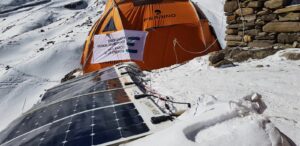Those who know me know very well the importance I give to caring for the environment. In addition, those accompanying me on my last expeditions experienced I am inflexible on this issue: it is our obligation to take care of nature. This is why, for example, I do not allow them to carry plastic bottles during our adventures and expeditions. And if I miss one, you can be sure you are going to bring it down and deposit it where it is due. I am aware I can be heavy and uncompromising but my commitment makes me act in this way.
For several years I have liked to get involved in projects helping our planet. Or that, at least, they make our passage leave the least possible footprint on earth. We have already punished her too much for many years. In addition, I try to ensure that my expeditions have a strong sustainable character. To continue with the example of water, instead of bringing up cans, what we do is treat the water provided by snow or ice.
Trust me, I don’t do all this because it’s cool. As I say, it is something that I have deep inside. At home they taught me to take care of nature and the importance of helping those who need it most and I do it in the best way I know. Many times, when I go to the mountains near my town (Anboto, Mugarra, Gorbea …), I stop training to start collecting all the plastics that I see around me. I always end up coming down with a few kilos of garbage that other people have left behind. It’s something I have inside. My eyes hurt when I see garbage in the mountains.
This personal commitment made alliances emerge in a very natural way with the ENTE VASCO DE LA ENERGÍA and the EKI Foundation. Institutions with whom I share vision and values, like those friends with whom with just a glance you say everything.

What Fundación EKI does is absolutely interesting. I fell in love when they told me about the project several years ago. To sum it up in a few words, they focus their efforts on supplying autonomous electrical energy sources (mainly photovoltaic solar) to educational, health, and social interest centers in developing countries, especially in Africa. They have been doing it since 2017. And the thing is that on the planet there are still, according to what they told me, more than 1,000 million people -one in seven- without access to electricity, of which 600 millions live in Sub-Saharan Africa. Very hard.
For this year’s expedition, as they did when we went to Everest in 2019-2020, the EKI Foundation has provided us with solar panels that allow us to avoid energy supply problems in base camp. We take advantage of the sunlight and these plates to supply ourselves 100%, without the need for power generators (and fuels). Up here we use many devices that need energy: batteries, telephones, radios, computers, weather stations, drones … well, we are not going to use a liter of fuel. Something we are very proud of.
